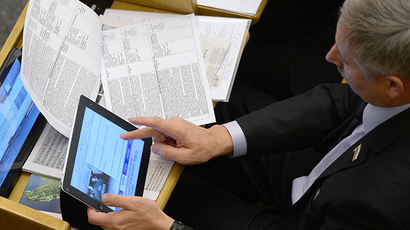Lawmakers seek to fast track law on personal data storage in Russia

A group of State Duma MPs want to speed up the enforcement of the recently-approved law obliging all web firms, including social networks, to store the personal data of Russian users on the country’s territory.
The suggestion is being sponsored by lawmakers from parliamentary majority party United Russia, nationalist party LDPR and the Communist Party of the Russian Federation. They say that the bill, initially scheduled to come into force on September 1, 2016, must be introduced already on January 1, 2015, quoting security concerns and increasing pressure from foreign nations provoked by the ongoing crisis in Ukraine.
MP Evgeny Fyodorov (United Russia) has said in an interview with mass circulation daily Izvestia that the faster Russia gets control over servers with users’ data, the more secure it would be against the attempts to influence its domestic politics from abroad.
“The internet is a direct tool of the orange intervention and we all know that such intervention is followed by mass killings of tens of thousands of people,” the lawmaker said. “Internet campaigns are usually the first stage of the process and they are done through sanctions and through manipulations with foreign-based data centers. They censor and revise all events that take place in Russia. All information that is stored there can be used against Russia. Therefore, we must take these sites under national control in order to protect our country.”
MP Vadim Dengin (LDPR) asked reporters not to exaggerate the scale of the proposed state control over the web.
“The destructive forces should stop speculations over this topic – the internet has always been a free discussion site, but it still needs some rules. These rules are essentially that Russia is not introducing an ‘iron curtain’, but we are moving towards putting certain things on the internet in order,” Dengin told reporters.
“The data must be stored inside our country. Those who have started to panic all want to control the information about our citizens for their own business purposes,” he noted.
Aleksandr Yushchenko assured the public that the popular web services and social networks, such as Facebook and Twitter were not in jeopardy as they could easily rent server space from Russian firms.
The law obliging all internet companies which collect personal information from Russians to store that data inside the country was approved by the parliament and signed by the president in early July this year. Websites that don’t comply with the law will find themselves blacklisted by Roscomnadzor, which will then have the right to limit access to them.
The sponsors of the bill have claimed that it was in line with the current European policy of trying to legally protect online personal data. Deputy chairman of the Duma’s Committee on Information Policy, Leonid Levin, said the Russian law serves goals similar to those of the recent decision by European Court of Justice, which endorsed the so-called ‘right to be forgotten’, obliging Google to remove upon request links to personal data.
“The security of Russians’ personal data is one of the basic rights that should be protected, legally and otherwise,” he noted.














